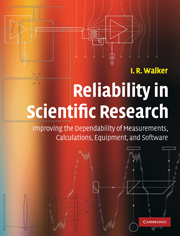 Reliability in Scientific Research
Reliability in Scientific Research Published online by Cambridge University Press: 05 June 2012
Introduction
Aside from leaks, which are discussed in Chapters 6 and 8, and outgassing, which is discussed in Chapter 6, other kinds of problem often afflict vacuum apparatus. For instance, vacuum pumps are frequently mechanical devices, and can suffer from the reliability difficulties that are common to machines in general. Contamination is often a concern in vacuum systems, and the pumps themselves are frequently sources of contaminants. These often take the form of pump oils and their vapors, and various types of particulate matter. Besides these general difficulties, there are numerous others that are peculiar to each particular type of pump.
Vacuum gauges are generally affected by contamination, and are often degraded by substances released from the pumps. The vibrations produced by some vacuum pumps can, in addition to increasing the likelihood of leak problems, also damage delicate structures inside certain vacuum gauges. (These points are also relevant for mass spectrometers, which are common items in vacuum equipment.)
These issues, and others pertaining to the use of vacuum equipment, are discussed in the following chapter.
Vacuum pump matters
Primary pumps
General issues concerning mechanical primary pumps
Perhaps the most serious problem pertaining to the use of mechanical vacuum pumps concerns, not difficulties with the pumps themselves, but those that they may cause to the rest of the system in the form of contamination – especially by pump oil.
To save this book to your Kindle, first ensure [email protected] is added to your Approved Personal Document E-mail List under your Personal Document Settings on the Manage Your Content and Devices page of your Amazon account. Then enter the ‘name’ part of your Kindle email address below. Find out more about saving to your Kindle.
Note you can select to save to either the @free.kindle.com or @kindle.com variations. ‘@free.kindle.com’ emails are free but can only be saved to your device when it is connected to wi-fi. ‘@kindle.com’ emails can be delivered even when you are not connected to wi-fi, but note that service fees apply.
Find out more about the Kindle Personal Document Service.
To save content items to your account, please confirm that you agree to abide by our usage policies. If this is the first time you use this feature, you will be asked to authorise Cambridge Core to connect with your account. Find out more about saving content to Dropbox.
To save content items to your account, please confirm that you agree to abide by our usage policies. If this is the first time you use this feature, you will be asked to authorise Cambridge Core to connect with your account. Find out more about saving content to Google Drive.